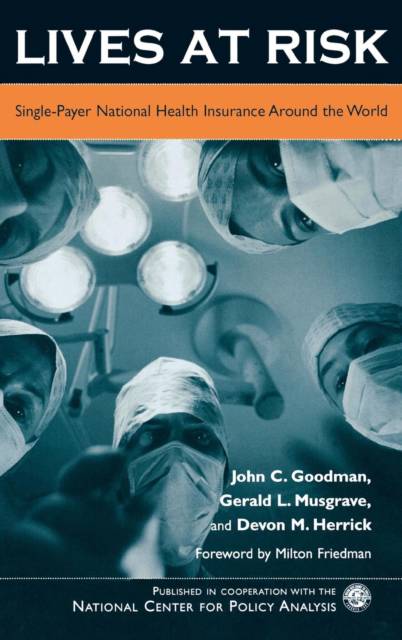
- Afhalen na 1 uur in een winkel met voorraad
- Gratis thuislevering in België vanaf € 30
- Ruim aanbod met 7 miljoen producten
- Afhalen na 1 uur in een winkel met voorraad
- Gratis thuislevering in België vanaf € 30
- Ruim aanbod met 7 miljoen producten
Zoeken
Lives at Risk
Single-Payer National Health Insurance Around the World
John C Goodman, Gerald L Musgrave, Devon M Herrick
Hardcover | Engels
€ 254,45
+ 508 punten
Uitvoering
Omschrijving
Virtually everyone agrees that our health care system needs reform. But what kind of reform? Some want a return to the system that prevailed in the 1950s. Others would like to see the adaptation of the government-run systems prevalent in other countries. The latter, national health insurance or single-payer health insurance, appears to be gaining ground in the United States. Before Americans find themselves participating in a health care system that has failed in every country it was adopted, we should be asking ourselves whether such a system is effective and efficient. In Lives at Risk, the authors examine the critical failures of national health insurance systems without focusing on minor blemishes or easily correctable problems. In doing so, the purpose is to identify the problems common to all countries with national health insurance and to explain why these problems emerge. Most national health care systems are in a state of sustained internal crisis as costs rise and the stated goals of universal access and quality care are not met. In almost all cases, the reason is the same: the politics of medicine. The problems of government-run health care systems flow inexorably from the fact that they are government-run rather than market driven.
Specificaties
Betrokkenen
- Auteur(s):
- Uitgeverij:
Inhoud
- Aantal bladzijden:
- 272
- Taal:
- Engels
Eigenschappen
- Productcode (EAN):
- 9780742541511
- Verschijningsdatum:
- 1/01/2004
- Uitvoering:
- Hardcover
- Formaat:
- Genaaid
- Afmetingen:
- 152 mm x 229 mm
- Gewicht:
- 571 g

Alleen bij Standaard Boekhandel
+ 508 punten op je klantenkaart van Standaard Boekhandel
Beoordelingen
We publiceren alleen reviews die voldoen aan de voorwaarden voor reviews. Bekijk onze voorwaarden voor reviews.








